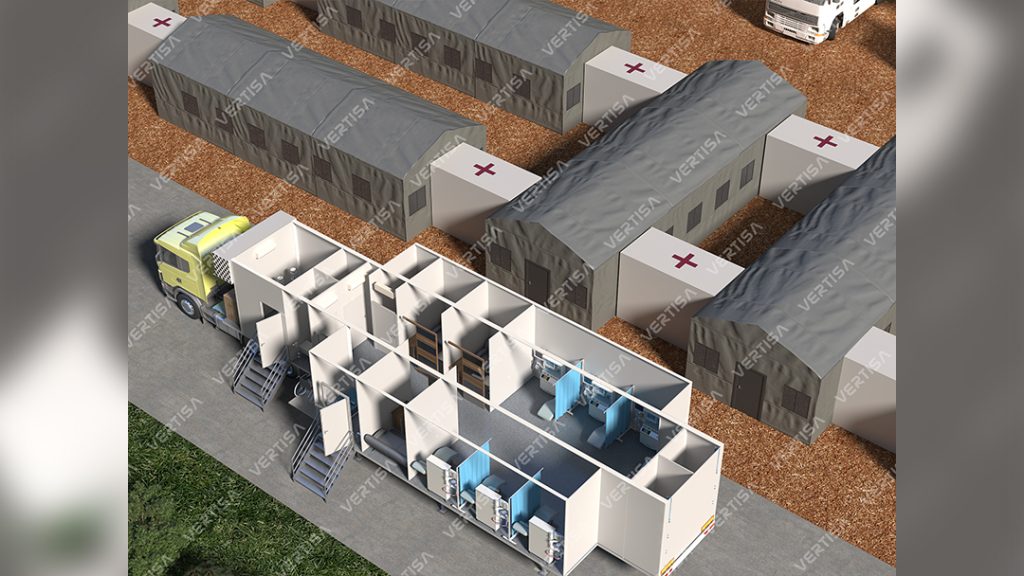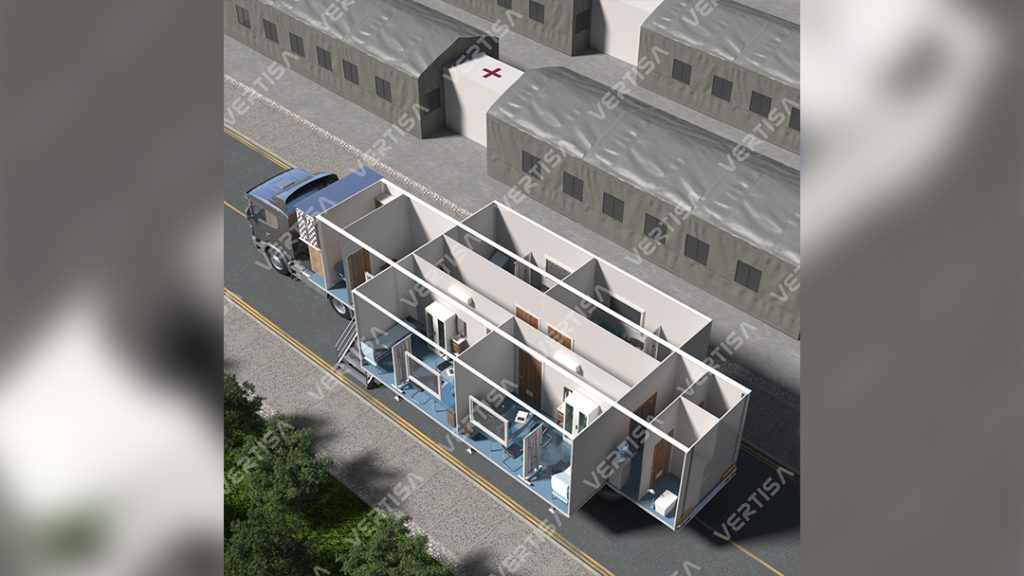Article:
In the realm of emergency medical services, the concept of a “mobile intensive care unit” (MICU) is reshaping patient care. This comprehensive article explores the multifaceted significance of mobile intensive care units, discussing their benefits, operational considerations, and the pivotal role they play in delivering advanced critical care.
Introduction: Empowering Critical Care On-the-Go: Exploring the Mobile Intensive Care Unit
As medical technology and healthcare systems evolve, the integration of mobile intensive care units has emerged as a critical advancement. This article offers a deep dive into the world of mobile intensive care units, shedding light on their capabilities, challenges, and transformative impact on emergency medical services.
The Benefits of Mobile Intensive Care Units:
1)Rapid Response and Advanced Care Delivery: Bringing Critical Care Where It’s Needed
Mobile intensive care units are equipped to provide immediate medical interventions at the scene of an emergency. With advanced medical equipment and trained personnel on board, these units offer a higher level of care than traditional ambulances, significantly improving patient outcomes in critical situations.
2)Reduced Time to Treatment: Minimizing Delays, Maximizing Survival
In time-sensitive medical emergencies, every second counts. Mobile intensive care units shorten the time between the onset of a medical crisis and the initiation of life-saving treatments. This reduction in “door-to-treatment” time has a direct correlation with increased survival rates and better patient prognosis.
3)Prehospital Stabilization: Averting Deterioration Before Hospital Arrival
Mobile intensive care units excel in providing prehospital stabilization. By administering advanced interventions such as airway management, cardiac monitoring, and medication administration, these units prevent patients’ conditions from deteriorating further while en route to the hospital.
Operational Considerations and Challenges:
1)Team Composition and Training: Equipping the Best for Critical Situations
The composition of a mobile intensive care unit’s medical team is pivotal. Highly trained paramedics, critical care nurses, and physicians collaborate seamlessly to deliver advanced medical interventions. Continuous training and skill development ensure that the team remains proficient in handling diverse critical care scenarios.
2)Equipment and Technology Integration: Advancements that Save Lives
The technology onboard a mobile intensive care unit is a lifeline for patients. From advanced cardiac monitors and defibrillators to portable ventilators and point-of-care testing devices, the integration of cutting-edge equipment enhances the unit’s capacity to diagnose and treat complex medical conditions.
3)Navigating Traffic and Access Challenges: Reaching Patients Swiftly and Safely
While speed is essential, the safety of patients and medical personnel is paramount. Mobile intensive care units are equipped with advanced navigation systems that help them navigate through traffic and find the quickest and safest routes to reach patients in need.
Transforming Emergency Medical Services:
1)Critical Care Beyond Hospital Walls: Expanding the Reach of Medical Expertise
Mobile intensive care units extend critical care beyond the confines of hospital walls. By providing advanced medical interventions at the scene of an emergency, these units bridge the gap between the onset of a medical crisis and a patient’s arrival at the hospital, significantly improving the chances of a positive outcome.
2)Supporting Interhospital Transfers: Seamless Continuity of Critical Care
Mobile intensive care units also play a pivotal role in interhospital transfers of critically ill patients. These units ensure that patients receive continuous, high-level care during the transfer process, minimizing the risk of deterioration and complications.
3)Community Education and Outreach: Promoting Health and Safety Awareness
Mobile intensive care units are not only providers of critical care but also educators. Through community outreach programs and health awareness campaigns, these units contribute to enhancing public knowledge about emergency preparedness, early intervention, and the importance of timely medical assistance.
Conclusion:
Elevating Critical Care: The Ever-Evolving Mobile Intensive Care Unit
The realm of emergency medical services is undergoing a paradigm shift, and at the forefront of this transformation is the mobile intensive care unit. With its ability to deliver advanced critical care swiftly and effectively, the mobile intensive care unit stands as a symbol of hope and healing in times of medical crises.
In conclusion, the mobile intensive care unit (MICU) stands as a testament to the remarkable synergy of medical expertise, technological advancement, and a patient-centered approach. These specialized units have redefined the landscape of emergency medical services, elevating the standard of critical care and reshaping the trajectory of patient outcomes.
Embracing Technological Advancements:
1)Telemedicine Integration: Revolutionizing Remote Consultations
The integration of telemedicine capabilities within mobile intensive care units opens doors to remote consultations with specialists. In complex cases, remote experts can provide real-time guidance to on-site medical teams, ensuring optimal treatment decisions and enhancing patient care.
2)Data-Driven Decision-Making: Harnessing Analytics for Better Outcomes
Mobile intensive care units generate a wealth of patient data that can be leveraged for insights. By analyzing this data, healthcare professionals can identify trends, patterns, and opportunities for improving clinical protocols, ultimately leading to better patient outcomes.
Sustaining Excellence in Critical Care:
1)Continuous Training and Skill Development: Ensuring Unwavering Proficiency
The medical personnel serving in mobile intensive care units require ongoing training and skill development. Regular simulation exercises, workshops, and exposure to diverse critical care scenarios contribute to maintaining high levels of proficiency and readiness.
2)Quality Assurance and Outcome Measurement: Elevating Accountability
Quality assurance measures, including adherence to clinical guidelines and performance metrics, play a crucial role in sustaining excellence in critical care. Tracking and measuring outcomes enable healthcare institutions to identify areas for improvement and ensure consistent delivery of high-quality care.
Global Impact and Future Prospects:
1)International Collaboration: Sharing Knowledge, Saving Lives
Mobile intensive care units have the potential to foster international collaboration in emergency medical services. Healthcare systems worldwide can share best practices, exchange knowledge, and collaborate on research to elevate the standard of critical care on a global scale.
2)Research and Innovation: Pioneering Advancements in Critical Care
Mobile intensive care units also serve as platforms for research and innovation. Through clinical trials, studies, and data collection, these units contribute to advancing medical knowledge and pioneering new approaches to critical care treatment.
The Path Forward:
1)A Holistic Vision of Critical Care: Redefining the Possibilities
The journey of the mobile intensive care unit is marked by a commitment to innovation, excellence, and patient-centered care. As healthcare systems continue to evolve, these units will remain pivotal in shaping the future of critical care, redefining what is possible and instilling hope in moments of medical crisis.
In conclusion, the mobile intensive care unit (MICU) represents a pinnacle of medical innovation and human dedication. This remarkable fusion of advanced technology, specialized training, and rapid response capabilities has ushered in a new era of critical care. As we navigate the ever-evolving landscape of healthcare, the MICU stands as a beacon of hope and a testament to the incredible feats that can be achieved when medical expertise and cutting-edge technology converge.
Addressing Rural Healthcare Disparities:
1)Rural Reach and Accessibility: Bridging the Healthcare Divide
One of the most significant contributions of mobile intensive care units is their potential to address healthcare disparities in rural and remote areas. These units can traverse challenging terrains to provide timely critical care, ensuring that patients in underserved regions receive the medical attention they urgently need.
2)Medical Outreach and Education: Nurturing Health Awareness
Mobile intensive care units not only deliver critical care but also serve as platforms for health education and outreach. They can engage with communities, offering information on preventive measures, early intervention, and healthy lifestyles, thereby fostering a culture of health and well-being.
Operational Excellence and Continuous Improvement:
1)Efficiency Through Coordination: Seamless Integration with Hospitals
The success of mobile intensive care units relies on effective coordination with hospitals. Streamlined communication and information sharing ensure that patients seamlessly transition from prehospital care to hospital-based treatments, facilitating continuity of care and improved patient outcomes.
2)Patient Feedback and Satisfaction: A Driving Force for Enhancement
Mobile intensive care units can actively seek patient feedback to enhance their services. Patient experiences and suggestions can lead to refinements in protocols, medical interventions, and overall service quality, further elevating the standard of care.
A Glimpse into Tomorrow:
1)AI and Predictive Analytics: Anticipating Patient Needs
The integration of artificial intelligence and predictive analytics holds promise for the future of mobile intensive care units. These technologies can analyze patient data, predict deterioration trends, and alert medical teams to potential emergencies, enabling proactive interventions.
2)Expanded Scope of Services: Beyond Critical Care
While the focus of mobile intensive care units is on critical care, their scope of services could expand to include preventive care, health screenings, and even vaccinations. This evolution would contribute to a holistic approach to healthcare, promoting overall well-being.
The Unwavering Commitment:
- The Human Touch in Critical Care: Compassion Amid Complexity
Beyond the technology and medical expertise, mobile intensive care units bring a human touch to critical care. The compassion, empathy, and dedication of medical professionals create a supportive environment that plays a vital role in patients’ healing journey.



